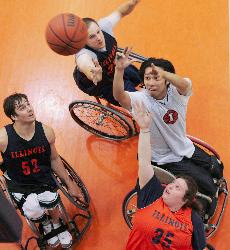Illinois wheelchair basketball ready for ‘Dawn Till Dusk’

September 28, 2006
When “national championship” and “Illini basketball” are uttered in the same sentence, people immediately picture Jamar Smith, Brian Randle and the men’s varsity team.
But there is another squad on campus that’s hoping to take it all this year: the men’s wheelchair basketball team.
On Sept. 15, the team held its first meeting of the year. They laid out their goals for the season in preparation for the first official practice on Oct. 1.
In the meantime, they’ve been collecting pledges for their upcoming “Dawn Till Dusk” tournament. The event, which kicks off the season for the team, will be held on Oct. 6 at Huff Hall, 1206 S. Fourth St.
During the tournament, the men’s and women’s teams will form two co-ed teams and participate in one continuous game for roughly 12 hours.
Get The Daily Illini in your inbox!
“What we’ll do is throw the ball up at the official time of dawn and play until the sun sets that night,” said Mike Frogley, head coach of the men’s and women’s teams.
“It’s a great tip-off to the season. We use it as something to create awareness about our team,” he added.
The funds generated from the tournament go toward paying for equipment, and a portion of the money is donated to various charities.
Following the tournament, the team will head to Baltimore to participate in the Brandy Zimmerman Memorial Tournament on Oct. 22. Zimmerman was a University wheelchair athlete who was killed last year in a car accident.
In recent years, the men have gained national attention, thanks in part to the media frenzy surrounding their able-bodied counterparts.
The team has a significant fan base, and they were even featured on the CBS Evening News.
“It’s brought a lot more attention,” Matt Buchi, forward and senior in AHS, said.
“It’s also helped us a lot with our recruiting. The U of I name brings a lot of respect,” he noted.
Last year the team had a record of 22-15, finishing third in the college division.
The game is rough, and the rules are almost identical to those of traditional basketball.
The main difference is that there is no double dribble rule. Instead, players are allowed two pushes in between each bounce of the ball.
“It’s a unique sport, there’s no question about that, but it is a sport,” Frogley said.
Indeed, hard fouls are common, and players occasionally fall from their chairs.
The intensity of the sport has lured some fans away from traditional basketball and into the seats at the wheelchair games.
“I think the attraction difference is the contact and the actual effort to play the game,” Buchi said.
“I’ve heard of people seeing our games and then going to able-bodied games and not being as impressed,” he added.
This was the case for Fernanda Mendes, freshman in Engineering. Mendes, who grew up in Urbana, attended her first wheelchair basketball game last season and “fell in love with it.”
“It’s amazing how talented and athletic the men are,” she said. “They have so much upper body strength, allowing them to lift themselves in a matter of seconds whenever their chair flips over.”
Aside from their goal of a national championship, the squad hopes to achieve a 3.28 cumulative team GPA this year, shooting for one hundredth of a point higher than last year’s GPA of 3.27.
According to Buchi, that GPA is usually the highest of all wheelchair basketball teams.
This emphasis on academics is indicative of the value the team places on generating opportunities.
“The thing I think is most important about [wheelchair basketball] is how it teaches individuals about their potential,” Frogley said. “It gets them thinking, ‘if I can do this, what else can I do?'”
Buchi agreed.
“The most important thing is the opportunities it’s given me,” he said. “I’ve had the opportunity to attend a Big Ten university, which I probably wouldn’t have been able to do.”
Buchi, who began playing wheelchair basketball 10 years ago after a car accident left him paralyzed, has even traveled to Australia to compete. He also visited Japan to teach a wheelchair basketball team.
Most importantly, the sport defies the stereotypes surrounding wheelchair-bound people.
“When people see these guys, they don’t think ‘This is a person who can’t walk up a flight of stairs,'” Frogley said. “Instead they think, ‘Wow, this is an amazing achievement.'”






